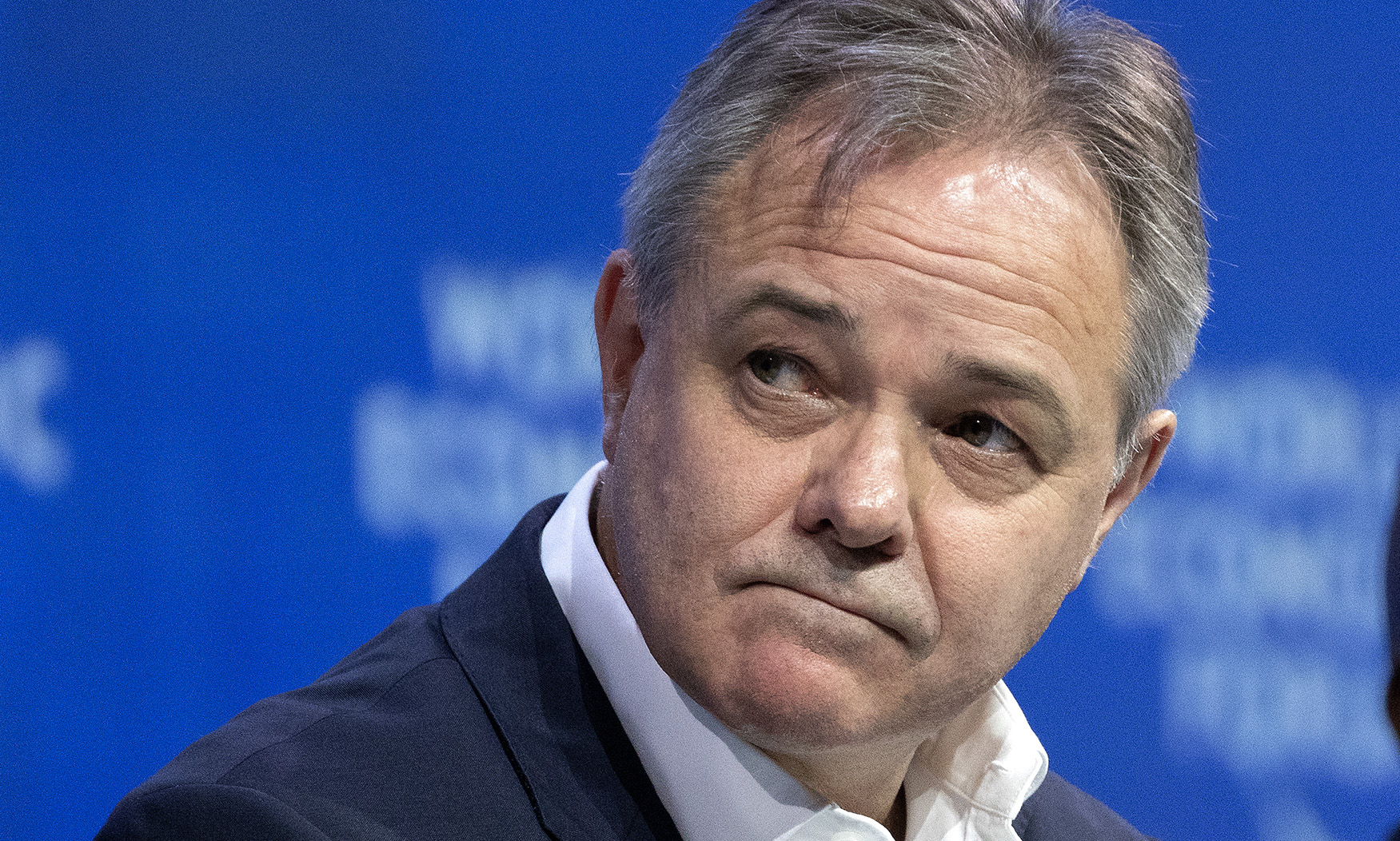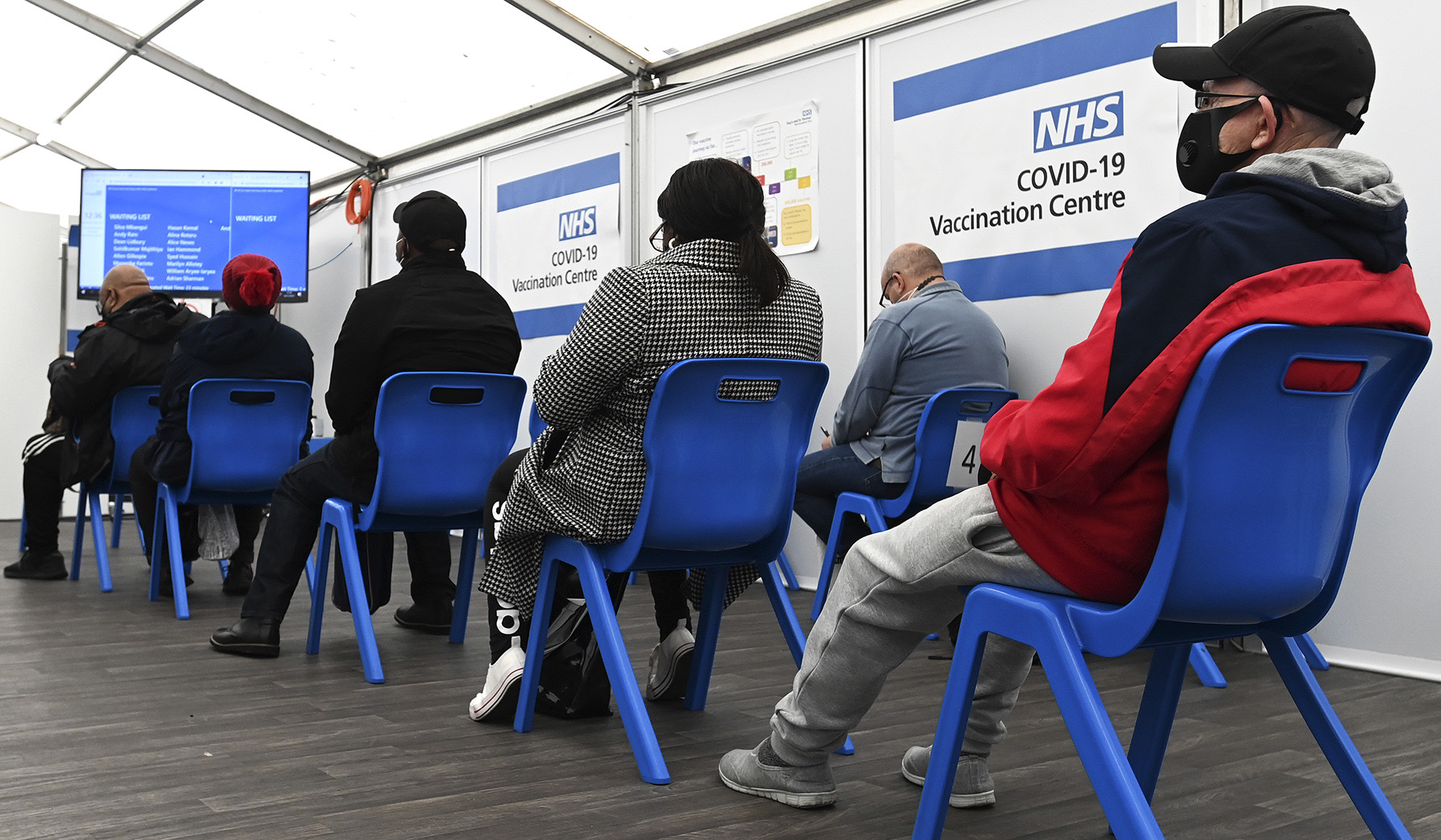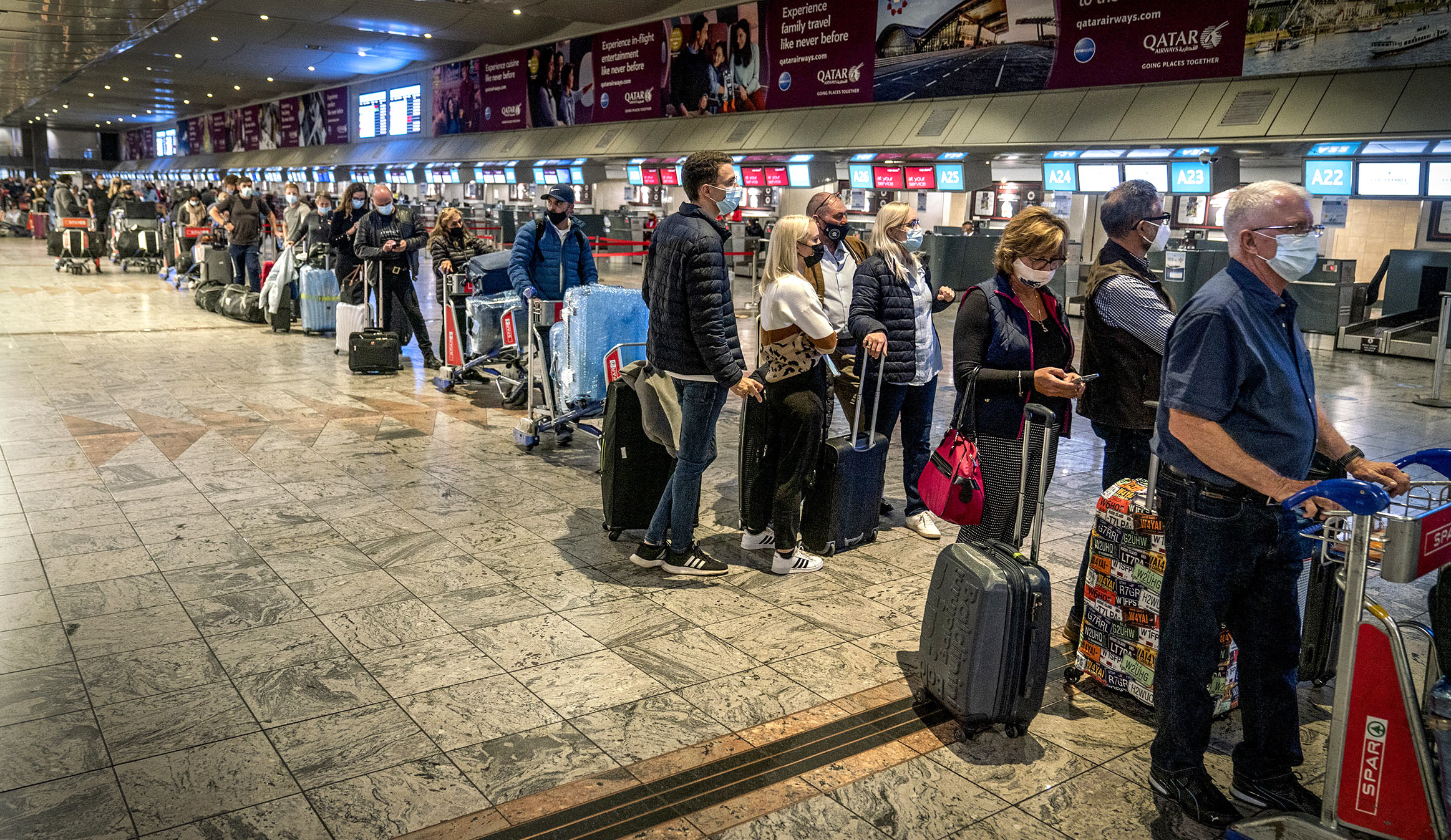Those who live in glass houses shouldn’t smack travel restrictions on others: The real view from Britain’s Covid-19 crisis – Published in the Daily Maverick, 29 November 2021
This is all so boringly predictable. Not just the mutations; the messy responses, too.
On day two of the global Omicron panic I wake up to messages littered with images of Brits squashing into OR Tambo International Airport, pushing to get on the last flights out – flying out of, and into, the eye of the storm.
It’s all so last year. Except it isn’t. It’s far worse.
In 2020, rates of Covid infection in South Africa were minuscule when the travel ban hit. Those who dodged quarantine and rushed back to infested Britain went straight into a lockdown. Now rates are much higher in both countries. The UK has counted 10 million cases and more than 145,000 deaths. We have very high vaccination rates, but the virus is dramatically more infectious and scientists at this stage do not know if it will dodge the vaccine, although they seem confident it will offer some protection against severe disease and hospital admission.
Jeremy Farrar, head of the UK’s largest research foundation, the Wellcome Trust, called for support for South Africa, noting that it’s a country with “great public health and science people, teams, infrastructure and close links into informed policymakers committed to sharing evidence”.
The same should also be true of the UK.

We’ve been at the forefront of vaccine research and development, we’re stuffed full of brilliant public health scientists, many of the best academic institutions in the world, and some of the smartest global health advocates.
Yet as a nation we don’t, or won’t, use it for good.
Covid, human rights and politics – the toxic mix
Covid has confirmed what many of us have been preaching for years: health, human rights and politics are tightly entwined. Research shows that countries with populist leaders have failed in their epidemic responses: Women in power: countries with female leaders suffer six times fewer Covid deaths and will recover sooner from recession, (Luca Coscieme, Open Democracy, 26 May 2020).
Prime Minister Boris Johnson’s governance style is clowning: most recently rambling about Peppa Pig and making toddler car noises to leaders of British industry.
I’ve written before about the failure of the UK’s response to Covid, most recently about how we’ve got the balance of public health measures wrong by emphasising the law and failing to educate and motivate behavioural interventions.
Here we are, doing it again.

Despite many of us begging for mask-wearing to be reintroduced after lockdown, as our Covid cases soared, it takes new variants in the “dark continent” of Africa for smart public health to win. The government cheerfully ignored the pleas of terrified Londoners forced to commute to minimum-wage jobs on Tube trains, crammed with arrogant “anti-mask” passengers coughing loudly as they snuggled up together.
Media stories focus on desperate families squeezing on to flights that will land before pricey quarantine is reimposed. I understand the financial worry: yet why no comment that they are likely to be creating superspreader events? Or that avoiding quarantine is a dumb thing to do in these circumstances?
Did any of them notice that at least one in 10 people hopping on a flight from Johannesburg to Amsterdam the day before tested positive for Covid on arrival?
The British approach to Covid has all been about “staying on the right side of the law” – and side-slipping it if you can.
Throughout 2020 doctors were constantly called on to explain complex new regulations being introduced seemingly daily. So many that the prime minister could never remember the rules, and his advisers were happy to flout them.
Then suddenly, in the vaccine era, the mantra was “informed choice”, especially on mask wearing. But how could people choose wisely when no one had ever informed them in the first place?
In the UK, alarmist news reports are the only form of public education.
The excommunication of South Africa
Of course South Africa’s news is alarming: exponential growth in cases; said to be “500% more infectious”; 2,858 new cases on Sunday, 28 November, a dramatic rise from a few hundred a day two weeks ago; the seeming toxic combination between Omicron and HIV infection; a minority of South Africans fully vaccinated, with take-up rates slowing – at least until this variant blazed into the headlines.

To most Brits, including many who are no fan of Johnson and his wretched “leadership” of our Covid response, it’s great news that we are slamming travel bans on African countries. At long last we are taking action – and doing it early for a change.
However, let’s pause.
Why would the man who ducked, dived and delayed every public health measure that the UK’s (more than capable) scientific advisers proposed, suddenly jump in early? This is the same man who delayed travel restrictions against India just long enough for a new trade deal to be sealed. His choice of priorities allowed Delta to brew nicely and explode all over the world. The tale of the Delta variant is the tale of one of Britain’s most successful exports after Brexit.
Maybe the impetuous action against South Africa on Thursday is Boris’s penance for mucking up Delta?
Maybe it’s another sleight of hand?
One of the consequences of Brexit is that Brits pay pitifully little attention beyond our shores – unless it is to fight with them (just take a look at the disgraceful spat with France, unleashed by the miserable deaths at sea of 27 migrants a few nights ago).
After Brexit, the UK’s “Little Britain” mentality is baked in.
We like to be different from our (former) cousins in European countries – especially the ones who are doing better than us with this pandemic.
Why would we wait for the World Health Organization (WHO), and all those clever scientists from around the world, to figure out what is going on? Or let the European Commission announce its plans first?
Why wait?
We can steal a march on “Johnny Foreigner” and sort things out faster, better…
Or maybe it’s a neat little tactic to distract people: Look at scary Africa; don’t look at the fact that our homegrown epidemic is wildly out of control.
And it’s out of control not because nasty foreigners are bringing highly infectious variants to our shores. Rather because Johnson and his cronies have consistently failed to put in place the public health interventions that might turn, or at least dent, the curve.
In the same 24 hours that South Africa reported more than 2,000 new cases, the UK reported more than 20 times as many: 50,091 Covid cases, and 160 deaths. The UK government’s Office for National Statistics (ONS) reported that one in 50 people had Covid last week. That’s about one million people.
The weekly number has been pretty stable for the past four months. No one seems to care.
Very few people are aware that we have it so much worse than most other countries; or that in other countries, such extraordinary rates of infection, alongside weekly death rates approaching 1,200 people, would be considered close to an emergency.
Now that Covid death rates in Britain have dropped below their peak of 9,000 a week, most people seem to imagine the problem is history, nothing to worry about.
If only that was true.
Britain: A winter of Covid discontent looms
While every South African news channel was busy flashing alerts and urging citizens to get vaccinated, masked and keep their distance during the glorious well-ventilated summer, thousands of mask-free Brits were squeezing into underventilated, overheated pubs, clubs, cinemas, sports stadiums, buses and trains, ignoring every public health measure that had ever been proposed.
Until Thursday there was more news attention on freedom marches taking off all over Europe, with angry “libertarians” rejecting measures to keep fellow citizens’ safe, than coverage of the WHO’s alarm bells that Europe is once again the epicentre of the Covid pandemic with rates surging.
We well-vaccinated Brits are “back to normal”. Or are we?
We have impressive rates of full vaccination – but we started early and so immunity is waning, especially among the elderly and vulnerable who were first in line. Since July hospital admissions have been creeping back up – including among the double vaccinated (my aunt was one of them), though still far below the highs we saw in January.
Death rates are far lower than last year – but they are climbing slowly, now accounting for 8.7% of all deaths; the curve of the graph isn’t going in the right direction.
Last winter Covid was responsible for 84% of all excess winter deaths in England. Snow is just starting to fall. Already, one month ago, the ambulance service reported that our Accident and Emergency (A&E) services are “on the edge of a precipice”. Ambulances often queue more than 11 hours to drop off their emergency patients; at least one person died of a heart attack in the back of an ambulance – after waiting more than hours outside A&E.
Sir Andrew Pollard, one of the leading scientists responsible for the Oxford Vaccine Group, has said that the UK’s high vaccination and the position of the Omicron mutations means that it is “unlikely to reboot Covid in the UK”. Handy because you can’t reboot something that was never shut down, like an epidemic which is still infecting one in 50 of your population every week.
Johnson’s sudden travel ban shows that what he does well is obfuscate and distract.
A long time ago some tougher public health interventions, including mask enforcement and smarter use of travel restrictions, quarantine and the like, might have helped the UK avoid the mess we’re in.
Right now, we are left with the brutal sound of the stable door slamming after the horses bolted many months ago.
And it is slamming hard in South Africa’s face.

Long Covid continues: Vaccines protect against it
Government statisticians (the ONS again) tell us that at least 1.2 million Brits are living with long Covid – and it is likely that they are joined by an extra 100,00 each week.
When I first failed to recover from my own acute Covid infection – which I wrote about in Daily Maverick back in June 2020 – the idea of long Covid was peculiar and not much believed, including by beloved friends. Now we know that at least one in 10 people (some say one-third) who get sick with Covid find that symptoms linger and evolve for at least three months; often for much longer.
I thought I had fully recovered after my first burst of the vaccine – 11 months after I first fell sick – but five months later tedious symptoms started to bite back. They weren’t as wretched as before, but still stop me from getting on with my life, and shock me with the premature ageing of it all.
Over the past 18 months I have met a huge number of people with long Covid from all continents – and a depressing number of people in their twenties and thirties whose lives and work have been interrupted dramatically by this remitting and relapsing condition; some (often dedicated health workers, infected occupationally) stranded in wheelchairs, still unable to cook or shop for themselves, and relying on relatives and friends to raise their children.
While you cannot know the long-term consequences of a disease until you’ve had it for a long time, we are inching towards knowing about prevention. Research shows that vaccinations reduce the risk of getting lingering symptoms of Covid, perhaps making long Covid three times less likely in those who are vaccinated (read Simon et al, Reduced Incidence of Long-Covid Symptoms Related to Administration of Covid-19 Vaccines Both Before Covid-19 Diagnosis and Up to 12 weeks after, 18 November 2021, (pre-print)).
Vaccines are good at an individual level: they reduce the likelihood of death, long Covid and the virus being passed on.
And vaccines play a vital role at a societal, global level, preventing the pandemic from shape-shifting and getting out of control – but only if they are shared equitably.
As former prime minister Gordon Brown points out: “A new Covid variant is no surprise when countries are hoarding vaccines.” Mutations arise because the virus is not suppressed and is given the chance to spread and change. No country is safe from Covid until all are. Despite having played a leading role in setting up COVAX, the UK has only given away 20.3 million vaccine doses – less than a quarter of what is already in British arms.
One thing we could do easily and do right now is live up to our promise to share vaccines equitably around the world. Yet we fail to do it with anything like the generosity needed.
